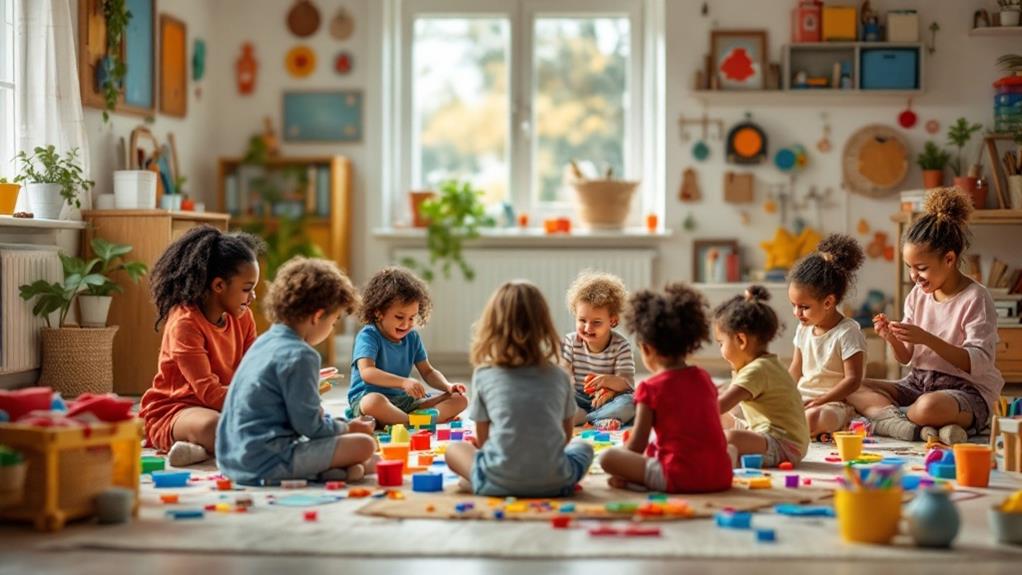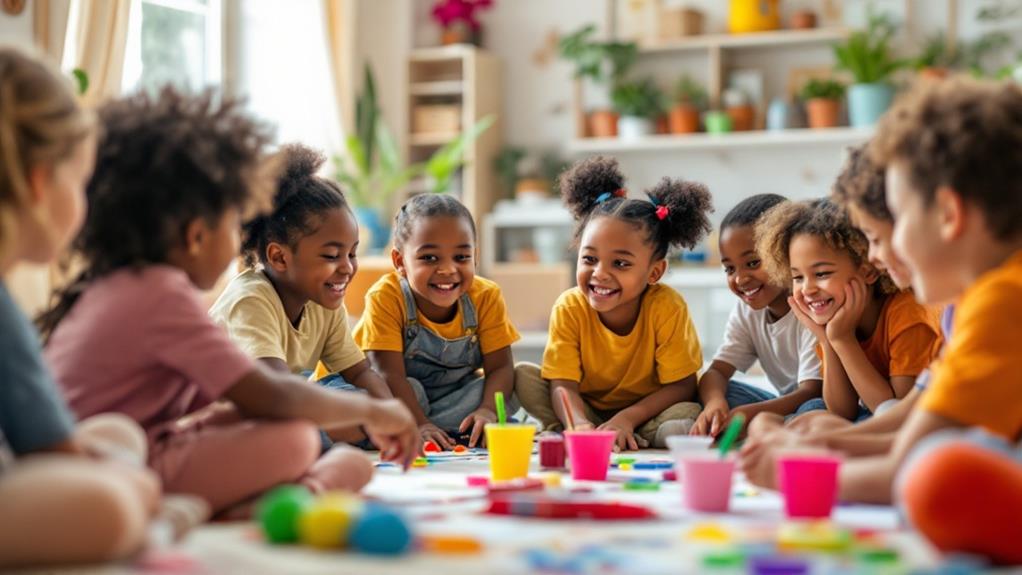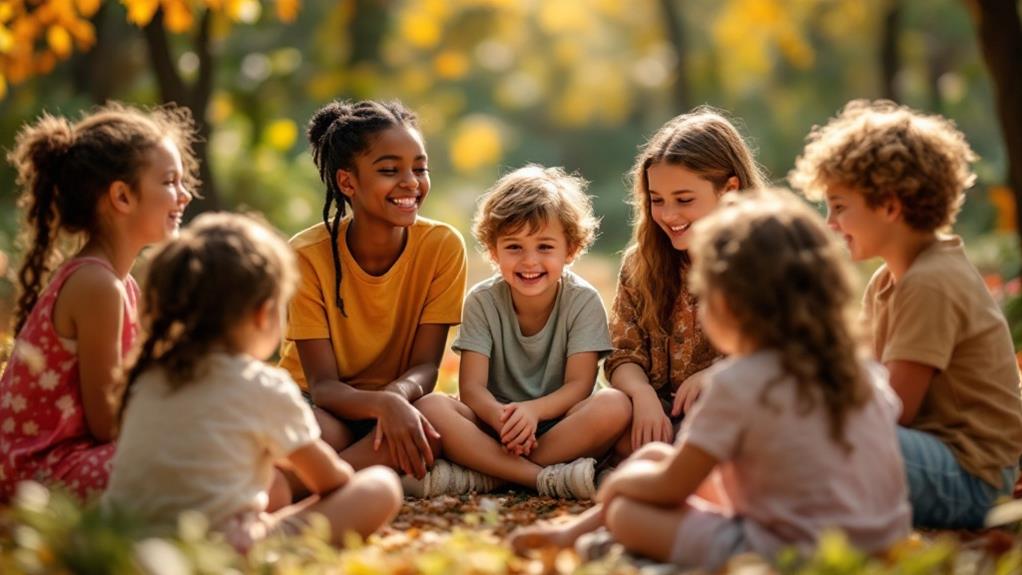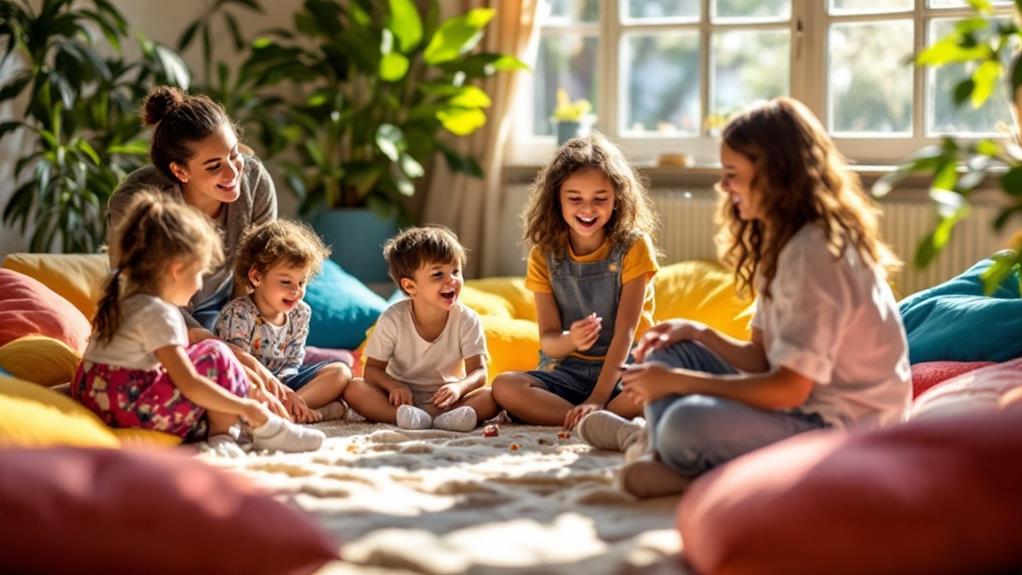Group therapy sessions are incredibly valuable for your child's growth. In these supportive settings, children connect with peers, practice active listening, and learn to express their feelings clearly. They face challenges together, fostering resilience and empathy. Through shared experiences, kids build teamwork skills, learn to resolve conflicts, and gain confidence in their social interactions. Each session nurtures a sense of belonging, ultimately helping them form meaningful relationships. This environment not only cultivates essential communication skills but also lays the groundwork for future success. There's so much more to explore about these enriching experiences and their lasting impacts.
Key Takeaways
- Group therapy fosters social connections, allowing children to build friendships and develop a sense of belonging in a supportive environment.
- It enhances communication skills by encouraging children to articulate their feelings and actively listen to others, enriching interactions.
- Teamwork is promoted through collaborative projects, teaching children to work together towards shared goals and resolve conflicts effectively.
- Children learn empathy and compassion by sharing experiences, which cultivates understanding and strengthens community bonds within the group.
- The safe environment of group therapy nurtures emotional resilience, empowering children to express themselves and adapt to challenges confidently.
Benefits of Group Therapy

Group therapy offers a unique space where children can connect with peers who share similar struggles and experiences. In this supportive environment, they're not just learning about themselves; they're also discovering the power of community.
You'll witness them gaining confidence as they share their thoughts and feelings, realizing they're not alone in their challenges. This sense of belonging can be incredibly healing.
When kids come together in group therapy, they develop empathy and compassion for one another. They learn to listen actively, fostering a culture of understanding and respect.
This shared experience helps them build resilience, as they navigate their emotions and learn how to support one another. You'll see them celebrate small victories together, which can spark a sense of hope and motivation.
Group therapy also encourages children to step outside their comfort zones. They'll learn that it's okay to be vulnerable, and that taking risks can lead to personal growth.
As they engage in discussions and activities, they strengthen their social skills and learn to collaborate effectively. In the end, these benefits create a solid foundation for their future, empowering them to face life's challenges with courage and confidence.
Enhancing Communication Skills
Effective communication is like a bridge that connects children to one another, allowing them to express their thoughts and feelings openly. In group therapy, children learn not just to speak, but to listen, empathize, and respond thoughtfully. This environment nurtures their ability to articulate their needs and emotions, fostering a sense of belonging and understanding.
Through shared experiences, children discover the power of words and the impact they've on relationships. They practice:
- Articulating feelings: Learning to express emotions clearly helps children navigate complex social situations.
- Active listening: Understanding the importance of listening builds respect and empathy among peers.
- Constructive feedback: Sharing insights encourages a supportive atmosphere where everyone's voice matters.
As you guide children in these sessions, you empower them to communicate effectively, enriching their interactions and enabling them to forge deeper connections.
Every conversation becomes a stepping stone toward self-expression and confidence. When children feel heard and understood, they not only grow individually but also contribute positively to the group dynamic, creating a tapestry of support that encourages each member to flourish.
Developing Social Interactions

Social interactions serve as the lifeblood of childhood development, shaping how kids connect with their peers and navigate the world around them. In group therapy sessions, children have the chance to engage with others in a safe environment, fostering genuine connections.
You might notice how your child learns to share their feelings, listen actively, and respond to others, all essential skills for building lasting friendships.
These interactions allow kids to explore different social roles and understand various perspectives. They learn empathy by witnessing their peers' struggles and triumphs, helping them connect on a deeper level. Imagine the joy in watching your child support a friend or celebrate their achievements. Each interaction paves the way for resilience and confidence.
Moreover, group settings provide opportunities for kids to practice conflict resolution. When disagreements arise, they learn to express themselves constructively, cultivating a sense of responsibility and respect.
As your child develops these social skills, you'll see their self-esteem flourish and their ability to form meaningful relationships grow.
Encouraging these interactions can empower children to thrive both socially and emotionally, setting a strong foundation for their future.
Fostering Teamwork Abilities
As your child maneuvers the landscape of friendships, they also begin to understand the importance of teamwork. In group therapy, they learn how to collaborate with peers, developing skills that will serve them throughout their lives.
This nurturing environment fosters a sense of belonging, encouraging your child to work together toward shared goals.
Through these sessions, they'll experience:
- Shared Responsibilities: Working on a project as a team helps children learn to share tasks and trust one another.
- Effective Communication: Expressing ideas and listening to others teaches them how to articulate thoughts clearly while valuing different perspectives.
- Conflict Resolution: Maneuvering disagreements in a supportive setting equips them with tools to resolve conflicts peacefully.
Building Emotional Resilience

Building emotional resilience is crucial for your child's development, equipping them with the tools to navigate life's ups and downs. In group therapy settings, your child learns to express their feelings openly, fostering a safe environment where vulnerability is embraced. Here, they can share experiences, realizing they're not alone in their struggles. This connection cultivates empathy and understanding, essential components of emotional strength.
As your child interacts with peers facing similar challenges, they begin to understand that setbacks are a part of life. They learn to bounce back from disappointment, cultivating a mindset that encourages perseverance. Each session becomes a stepping stone, empowering them to face adversity with courage and hope.
Through shared stories and collaborative problem-solving, your child develops coping strategies that resonate with their unique experiences. They gain confidence in their ability to manage emotions, making them more adaptable as they encounter new situations.
Ultimately, the skills your child acquires in group therapy will serve them throughout life, helping them to thrive in the face of challenges. By investing in their emotional resilience today, you're nurturing a future filled with possibilities.
Learning Conflict Resolution
Steering through emotions is just the beginning; learning how to resolve conflicts is another essential skill that group therapy offers. In these settings, children not only face their feelings but also learn how to navigate disagreements constructively. This experience is invaluable, equipping them with tools that last a lifetime.
Through group therapy, you can witness children develop the ability to:
- Communicate their feelings clearly and respectfully.
- Listen actively to others, fostering understanding.
- Collaborate with peers to find mutually agreeable solutions.
By engaging in role-playing and guided discussions, children practice conflict resolution in a safe environment. They learn that conflicts don't have to end in anger or resentment; instead, they can lead to growth and deeper connections.
You'll notice their confidence soaring as they gain the skills to tackle conflicts head-on, transforming potential disputes into opportunities for learning.
As they embrace these challenges together, children realize they're not alone in their struggles. They're building a supportive community where everyone's voice matters.
This journey toward effective conflict resolution isn't just about resolving issues; it's about nurturing compassion, understanding, and teamwork in the face of adversity.
Encouraging Empathy and Support

Fostering empathy and support within a group therapy setting creates a powerful foundation for children's emotional growth. When children learn to understand and share the feelings of their peers, they cultivate a sense of connection that enriches their social experiences.
You watch as they share their stories and listen intently, creating a safe space where vulnerability can thrive. This mutual understanding nurtures compassion, allowing each child to feel valued and heard.
In these group settings, you can help children recognize that everyone faces challenges, encouraging them to offer support to one another. As they practice validating each other's feelings, they build a network of emotional resilience.
You'll see them cheering each other on, sharing comforting words, and extending a hand during tough moments. This sense of community empowers them to be more sensitive to the emotions of others, fostering deeper relationships beyond the therapy room.
Boosting Self-Esteem and Confidence
When you lift a child's spirits through group therapy, you're not just boosting their self-esteem—you're igniting a spark of confidence that can illuminate their path forward.
In a group setting, children learn they're not alone in their struggles. This realization can be transformative, helping them embrace their uniqueness and feel valued.
As they share experiences and support one another, they begin to appreciate their strengths and capabilities, fostering a sense of belonging.
Here are some key benefits of boosting self-esteem and confidence in group therapy:
- Positive Reinforcement: Children receive encouragement from peers, reinforcing their belief in themselves.
- Shared Experiences: Realizing that others face similar challenges helps them feel less isolated and more capable.
- Skill Development: As they practice communication and teamwork, they gain the confidence to face new situations.
Creating a Safe Environment

Creating a safe environment in group therapy is essential for children to open up and explore their feelings. When kids feel secure, they're more likely to share their thoughts and experiences without fear of judgment. This safety allows them to express themselves authentically, fostering deeper connections with peers.
As a facilitator, your role is to establish trust by encouraging respect and kindness. Set clear boundaries and guidelines, so everyone understands the importance of confidentiality and support. Remind the children that their feelings are valid and that everyone's voice matters.
Celebrate their courage when they share, and gently guide conversations to guarantee that every child feels heard. You're not just creating a space for dialogue; you're nurturing an atmosphere of acceptance and understanding.
Over time, this safe environment cultivates a sense of belonging. Children learn that they can lean on each other, enhancing their social skills.
By fostering this trusting space, you empower them to navigate their emotions and build resilience. Remember, you're not just facilitating a session; you're laying the foundation for personal growth that can last a lifetime.
Embrace the journey together, and watch them thrive.
Long-Term Developmental Impact
The long-term developmental impact of group therapy on children can be profound and far-reaching. When you engage children in these sessions, you're not just helping them cope with immediate challenges; you're laying the groundwork for their future. The skills they cultivate in these settings can enhance their lives in ways you mightn't even realize at first.
- Improved Emotional Intelligence: Children learn to recognize and express their feelings, fostering empathy and understanding towards others.
- Enhanced Problem-Solving Skills: By collaborating with peers, they develop critical thinking and negotiation skills that are essential in everyday life.
- Stronger Resilience: Facing challenges together in a supportive environment teaches them to bounce back and adapt to adversity.
As you witness the transformation in these young hearts and minds, it's clear that group therapy isn't just about healing; it's about growth.
You're empowering children to embrace their individuality while learning the beauty of teamwork. This holistic approach nurtures their potential, enabling them to build healthier relationships and become compassionate, capable adults.
Your commitment to serving others is paving the way for brighter futures, one child at a time.
Conclusion
As you consider the transformative power of group therapy for children, imagine the profound growth that can unfold when they come together. Each session plants seeds of communication, teamwork, and resilience, nurturing their emotional landscape. The connections they forge and the empathy they cultivate will echo throughout their lives, shaping their futures in ways you might not yet envision. What if this experience is the key to releasing their potential? The journey is just beginning, and the possibilities are endless.
